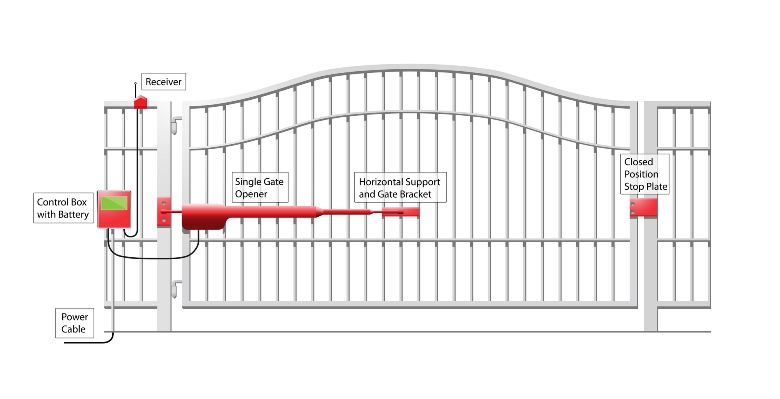First and foremost, electric gates are considered heavy-duty machinery and pieces of equipment, and as such, they must comply with set law and safety regulations.
Companies, as well as individuals who opt for electric gates to help secure their property and make it more aesthetically pleasing, must meet electric gate safety regulations and relevant regulations within the Health and Safety at work Act.
Failure to do so means you can face being sued or fined as a result of negligence.
In this post, we look at some of the important aspects surrounding safety regulations of automatic gates as well as the requirements of automatic gate safety.
Automatic gate safety requirements
Structural failure is the most common problem found with electric gates. This is why regular servicing and maintenance of your electric gates are vital.
Not just to ensure they last longer and maintain their functionality but also to ensure they’re still safe to operate and don’t pose any risk to you or anyone else.
Unfortunately, as with anything, wear and tear do happen over time. Weather conditions can also affect automatic gates too, and again your maintenance team should incorporate this into their planning and servicing regime with you.
If you have failed to maintain your gates and something does go wrong, you will most likely not be covered by your insurances – is it worth the risk?
The Law
When it comes to the law surrounding electric gates, several rules and regulations come into play.
As a summary, the most important, and ones to bear in mind include:
- EU Law – as part of European regulation, to ensure a high standard and to have peace of mind that products are of high quality, it is advised that you look for the CE marking on all gates, as well as the fair trade legislation.
- National Statutes – these statutes cover a range of health and safety laws and regulations.
- Health, Safety, & Welfare in the workplace – rules within this legislation requires employers to ensure the safety of the gates and their systems. Putting in place planned maintenance measures to avoid any problems and potential claims against them.
- Health and Safety at Work Act 1974 – Section 3 of this Act, in particular, outlines how automatic/electric gates must be kept safe for all users, and it is ultimately the owner’s responsibility to ensure this safety measure is upheld.
- Machinery Directive – all electric gates by law, must be installed in compliance with the Machinery Directive 2006/42/EC, as well as their supporting standards.
How to keep your gates law-abiding?
Use a professional design and installation team
Yes, it may be cheaper to install electric gates yourself, and we’re sure there’s a YouTube tutorial to talk you through it. Still, we can’t emphasize enough that professionals should always install electric gates.
A team that has experience in the field, working on a variety of different sites, and knows the laws surrounding the design, manufacture, and installation of such gates.
Following user instructions to the letter also forms a big part of this, and training on how to use the gate and the gates system should also play a big role.
Maintain for Safety
It is you as the owner of electric gates’ responsibility to continually check for wear and tear. Carrying out electric gate repairs as and when required and necessary will help to keep gates functioning safely at all times.
With an electric gate manufacturer in Leeds, like Adfabs Automated Gates, you can rest assured that your gate repairs are in good hands.
Risk assessments, competence, and training are a must!
Those who are working with powered gates do require various competencies depending on the role. This is why a homeowner or a business needs to use a professional company to look after their automatic gates.
A professional design and manufacturing team will carry out all automatic gate risk assessments before installation, carrying out all building services necessary during installation to make sure everything is 100% perfect, secure, and safe.
If you’re unsure of how to operate electric gates and their systems, or this is your first time with such equipment, make sure to ask your installation team for full training, providing you with complete peace of mind that you have everything under control.
Standards
There are several standards prevalent in the design, assessment, and testing of electric gates.
These standards are not mandatory, but they can help to show conformity to the Machinery Directive.
The directive is used to provide a clear explanation for installers and maintainers of electric gates and barriers, with standards including:
- BS-EN 1253:2001 – which focuses on the key requirements when it comes to crushing, shearing, and drawing on the gates. Including the maximum force allowed, acceptable technologies to provide protection, emergency release systems, and more.
- BS-EN12445 – this standard focuses on test methods and requirements as well as the compliant force and testing devices that must be used. (Gates should be force tested annually as a minimum standard).
- CE marking – a significant requirement which came into effect in 1995
- HSE – the safety notices within these guidelines help to inform a duty of care and responsibilities, all to ensure gate maintenance is brought up to standard.
At Adfabs, we work with all of our customers to provide the gates you want, at high-quality, competitive prices, and all compliant with laws and safety standards.
As one of the leading electric gate manufacturers in Leeds, if you’re looking to buy electric gates and you’re looking for a professional and experienced team, look no further than Adfabs.
Call us today on 01274 307117

